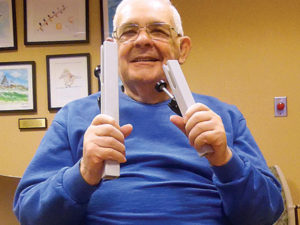Non-Alzheimer’s Dementia
Dementia is a general term referring to changes in the brain that affect memory and the ability to perform daily abilities. While Alzheimer’s is the most common form of dementia, accounting for 60-80 percent of all cases, it is not the only form of dementia. Other common forms of dementia include:
Vascular Dementia
Vascular dementia accounts for about ten percent of all dementia cases, and was once known as post-stroke dementia. Difficulty planning or organizing as well as impaired judgment are often early symptoms of vascular dementia. It is caused by injuries within the brain, such as blood vessel blockage and microscopic bleeding.
Dementia with Lewy Bodies (DLB)
This type of dementia produces memory loss and thinking problems that are similar to Alzheimer’s, but it differs in that people with DLB are more likely to have sleep disturbances, vivid hallucinations, muscle rigidity, and bodily movements similar to Parkinson’s symptoms. Clumps (Lewy bodies) of a protein called alpha-synuclein developing in the cortex of the brain cause this type of dementia.
Parkinson’s Disease
Parkinson’s disease is a neurological disorder affecting approximately 1 million Americans. While Parkinson’s disease is not a dementia, an estimated 50 to 80 percent of those who have Parkinson’s disease will eventually develop Parkinson’s disease dementia. Symptoms are very similar to dementia with Lewy bodies (DLB,) although the clumps in this type of dementia originate in the part of the brain called the substantia nigra.
Mixed Dementia
More than one type of dementia can occur simultaneously in the brain, and recent studies show that this may be more common than previously thought. Alzheimer’s and vascular dementia seem to occur together most frequently, but other type can occur together, as well.
Additional diseases and problems can produce changes in the brain resulting in dementia symptoms. It is important to discuss any concerns with a physician in order to determine the correct diagnosis and get the appropriate treatment.






